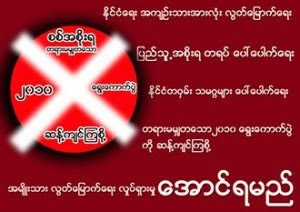May 5th, 2008
UN, agencies rush to ready aid for Myanmar cyclone victims, awaiting green light
By ALEXANDER G. HIGGINS,AP
Posted: 2008-05-05 13:18:02
GENEVA (AP) - U.N. and private aid agencies rushed Monday to prepare assistance for victims of a devastating cyclone in Myanmar, awaiting a government go-ahead.
As the death toll climbed toward 4,000, government officials indicated willingness to accept aid, but details how the aid is to be delivered need to be worked out first, said Elisabeth Byrs, spokeswoman for the U.N. Office for the Coordination of Humanitarian Affairs, or OCHA.
“The U.N. team has been activated and is ready to supplement the effort of the government in responding to this disaster as soon as they receive visas,” Byrs said.
Some potential donors said they appeared to need individual approval to deliver aid.
The United States said the Myanmar government had initially refused to allow a U.S. Disaster Assistance Response Team into the country to assess damage to follow up on an emergency contribution of US$250,000 (162,000).
“As of this moment, the Burmese government has not given them permission, however, to go into the country, so that is a barrier to us being able to move forward,” deputy U.S. State Department spokesman Tom Casey told reporters. “We asked for permission but the initial response from the government was that they were not inclined to let them in.”
Relief agency representatives met in Yangon, Myanmar’s biggest city, as well as the regional coordination center in Bangkok, Thailand, to assess the damage and prepare supplies.
A U.N. official in Myanmar said hundreds of thousands of people urgently need drinking water and shelter. The international Red Cross said the national Red Cross society was already distributing supplies.
“Widespread destruction is obviously making it more difficult to get aid to people who need it most,” said Michael Annear, regional disaster management coordinator for the International Federation of the Red Cross and Red Crescent Societies.
“We have received a long list of things that are needed, including shelter material, food, water purification stuff, tarpaulins and things like that,” CARE operations manager Carsten Voelz said in Geneva.
“Given the scale of what has happened, we would certainly have to beef up our personnel that are in the country,” Voelz said.
The United Nations Children’s Fund said it is working with other agencies and the Myanmar Red Cross Society to see how it can help those affected.
“We have five teams assessing the situation on the ground at the moment,” said UNICEF spokeswoman Veronique Taveau. “The situation seems to be quite difficult.”
Aid agencies usually need a government request for international assistance before dispatching staff and supplies to disaster-hit countries.
The European Union said it is providing 2 million (US$3 million) in urgent humanitarian aid for the cyclone victims.
“With every hour that passes, the news coming out of Myanmar gets grimmer and grimmer,” Development Commissioner Louis Michel said. “This is a terrible catastrophe that demands a quick and effective humanitarian response.”
German Foreign Minister Frank-Walter Steinmeier said he was making 500,000 (US$773,000) available to German aid organizations to help Myanmar build emergency housing, provide drinking water and purchase household necessities and mosquito nets.
“I appeal to the military government of Myanmar, in the interests of the people affected by the emergency, to allow an effective aid operation and to work together with international aid organizations,” he said in a statement from Berlin.
OCHA’s Byrs said the Myanmar Red Cross Society also is deploying five assessment teams.
The World Food Program has pre-positioned 500 tons of food in Yangon and plans to bring in more relief supplies, she said.
The U.N. Children’s Fund has relief stocks in Yangon, Taveau said, adding that bringing drinking water to people is critical. Large scale destruction often makes it difficult to reach the people affected by natural disaster, she said.
“We are basically standing on our toes, ready to run,” CARE’s Voelz said.
He said the list of needed supplies “was put together in Bangkok based on our experience on what you need in situations like that. As humanitarian organizations, we have worked in many cyclone situations, so we know what’s needed.”
Agencies outside Myanmar, also known as Burma, were awaiting word from representatives in the country who have been meeting with Myanmar officials, but communications are difficult with limited phone connections.
Yangon was mostly without electricity. Many roads remained littered with debris.
“It’s clear that we’re dealing with a very serious situation,” said Richard Horsey, a Thailand-based spokesman for OCHA.
“What is clear at this point is that there are several hundred thousands of people in dire need of shelter and clean drinking water,” Horsey said.
At a meeting with foreign diplomats and representatives of international aid agencies, Myanmar Foreign Ministry officials said they welcomed international humanitarian assistance and urgently needed roofing materials, plastic sheets and temporary tents, medicine, water purifying tablets, blankets and mosquito nets.
The situation in the countryside remained unclear because of poor communications and roads left impassable by the storm.
The international Red Cross said it is preparing support and funding for the national Red Cross society carrying out the relief work.
“The Myanmar Red Cross volunteers are already distributing some basic items and we are also supporting them with some initial assessment,” said Matthew Cochrane at the federation’s Geneva headquarters.
He said the international Red Cross has released 200,000 Swiss francs (US$189,000; 122,250) from their disaster relief emergency fund for this work.
“Reports are coming out of the delta coast, particularly the Irrawaddy region, that in some villages up to 95 percent of houses have been destroyed,” Cochrane said.
Other agencies taking part in preparations include Save the Children, Oxfam and World Vision.
Associated Press writers Eliane Engeler in Geneva, Matthew Lee in Washington, David Rising in Berlin, and Paul Ames in Brussels contributed to this report
(source: AP news)


































